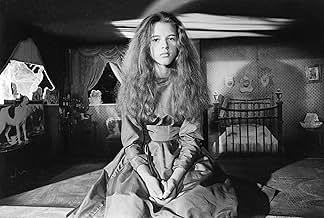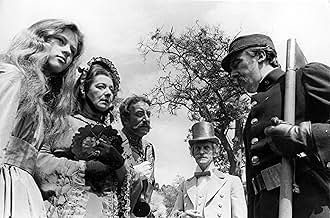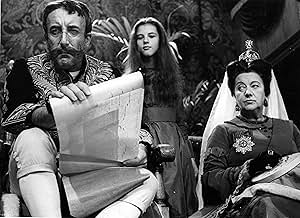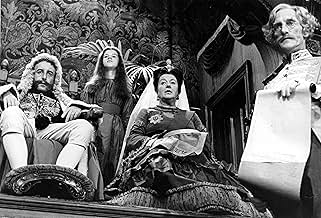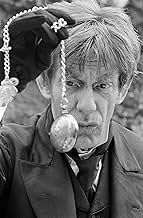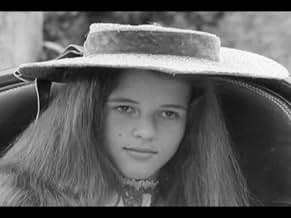NOTE IMDb
6,7/10
1,1 k
MA NOTE
Ajouter une intrigue dans votre langueA girl named Alice falls down a rabbit-hole and wanders into the strange Wonderland.A girl named Alice falls down a rabbit-hole and wanders into the strange Wonderland.A girl named Alice falls down a rabbit-hole and wanders into the strange Wonderland.
- Réalisation
- Scénario
- Casting principal
Jo Maxwell Muller
- Alice's Sister
- (as Jo Maxwell-Muller)
Michael Redgrave
- Caterpillar
- (as Sir Michael Redgrave)
Anthony Trent
- Fish Footman
- (as Tony Trent)
- …
Wilfrid Lawson
- Dormouse
- (as Wilfred Lawson)
Avis à la une
First time I saw this was on December 28th 1966 which was its first broadcast on BBC1, the next time was exactly 42 years later on a pristine BFI DVD. I was worried my childhood memories might be shattered by discovering it was simply a trippy '60's cop-out, but I needn't have been. Sure, it's a product of its time same as everything is, but it was and remains a unique filming of the classic tale by Lewis Carroll and imho the best version made so far.
Young Alice is transported by dream one sunny summer day to Wonderland where many adventures befall her. Whether Carroll was attracted or not to little girls ("I like all children, except boys") and whether that explains why his diaries had some ripped out pages at key moments is something we'll never know for sure now - I think he was merely a repressed idealist but he created a timeless story for children of all ages. His 90 page painstakingly hand written original edition which he gave to Alice in 1864 as "a Christmas gift to a dear child in memory of a summer day" is currently online from the British Museum and well worth a read.
Jonathan Miller's erudite sharp focus black and white production assumed that it was really meant for satirical adults, however it still managed to impress this particular 7 year old and especially his 5 year old wife to be and their counterparts 42 years later. Favourite bits: Michael Redgrave as the Caterpillar and John Geilgud as the Mock Turtle; Alice's walk with Duchess Leo McKern down the path through the woods followed by the camera crew weaving in and out of the trees and forward and backward; almost every scene has something of note though. Maybe I could have done with a bit more of Ravi Shankar's exceptional tunes but no worries. It's a pity John Bird's and Peter Sellers' post Goon Show improvisations were left in - it's no good Miller saying it was in the spirit of Carroll when their obvious inspiration was Spike Milligan, just one eg from 1954's Dreaded Batter Pudding Hurler Of Bexhill On Sea: "Suddenly! Nothing happened! But it happened suddenly mark you!" And I still wonder how much the production influenced the Beatles with their image for 1967? Apparently the finished film was considered too long by the BBC and 30 minutes were chopped off. Off with their heads - all those potential Pinteresque moments lost!
This is something to treasure: an arty BBC film that was genuinely arty, entertaining and still eminently watchable generations later. It almost managed to capture the illusive illusionary qualities of dreams and those seemingly beautifully languid sunny days of the '60's both 19th and 20th century.
Young Alice is transported by dream one sunny summer day to Wonderland where many adventures befall her. Whether Carroll was attracted or not to little girls ("I like all children, except boys") and whether that explains why his diaries had some ripped out pages at key moments is something we'll never know for sure now - I think he was merely a repressed idealist but he created a timeless story for children of all ages. His 90 page painstakingly hand written original edition which he gave to Alice in 1864 as "a Christmas gift to a dear child in memory of a summer day" is currently online from the British Museum and well worth a read.
Jonathan Miller's erudite sharp focus black and white production assumed that it was really meant for satirical adults, however it still managed to impress this particular 7 year old and especially his 5 year old wife to be and their counterparts 42 years later. Favourite bits: Michael Redgrave as the Caterpillar and John Geilgud as the Mock Turtle; Alice's walk with Duchess Leo McKern down the path through the woods followed by the camera crew weaving in and out of the trees and forward and backward; almost every scene has something of note though. Maybe I could have done with a bit more of Ravi Shankar's exceptional tunes but no worries. It's a pity John Bird's and Peter Sellers' post Goon Show improvisations were left in - it's no good Miller saying it was in the spirit of Carroll when their obvious inspiration was Spike Milligan, just one eg from 1954's Dreaded Batter Pudding Hurler Of Bexhill On Sea: "Suddenly! Nothing happened! But it happened suddenly mark you!" And I still wonder how much the production influenced the Beatles with their image for 1967? Apparently the finished film was considered too long by the BBC and 30 minutes were chopped off. Off with their heads - all those potential Pinteresque moments lost!
This is something to treasure: an arty BBC film that was genuinely arty, entertaining and still eminently watchable generations later. It almost managed to capture the illusive illusionary qualities of dreams and those seemingly beautifully languid sunny days of the '60's both 19th and 20th century.
This is an experimental TV-movie from the BBC's "Wednesday Play" anthology. That series was always willing to risk trying something different, and this ambitious, low-budget "Alice" is certainly different. I don't exactly *enjoy* this film, but it's certainly fascinating.
I appreciate it as an experiment in what television could do. I admire the cast of iconic and talented Britons who wouldn't normally coincide in the same project: Peter Sellers, John Gielgud, Leo McKern (in drag as the Duchess), Michael Redgrave, Peter Cook, Wilfrid Brambell, Alan Bennett, Malcolm Muggeridge, etc.
I also admire the creativity it took to imagine this quintessentially British tale accompanied by Ravi Shankar music.
Some viewers may find the film too creepy and surreal, but the original book is pretty disturbing to begin with. This film is fairly incoherent, but then so is the book, which follows the ever-shifting logic of a dream.
The biggest problem (aside from pacing that now seems too leisurely) is that Miller's production assumes you already know what's going on. For instance, it assumes you know that the two men dressed as... um... men are actually the Gryphon and the Mock Turtle.
In other words, this is an "Alice" for people who are already overdosed on adaptations of "Alice," and who might appreciate a weirdly different take on the familiar story. Or to narrow that audience a bit, people age 12 and up who might appreciate a different take on the story.
I appreciate it as an experiment in what television could do. I admire the cast of iconic and talented Britons who wouldn't normally coincide in the same project: Peter Sellers, John Gielgud, Leo McKern (in drag as the Duchess), Michael Redgrave, Peter Cook, Wilfrid Brambell, Alan Bennett, Malcolm Muggeridge, etc.
I also admire the creativity it took to imagine this quintessentially British tale accompanied by Ravi Shankar music.
Some viewers may find the film too creepy and surreal, but the original book is pretty disturbing to begin with. This film is fairly incoherent, but then so is the book, which follows the ever-shifting logic of a dream.
The biggest problem (aside from pacing that now seems too leisurely) is that Miller's production assumes you already know what's going on. For instance, it assumes you know that the two men dressed as... um... men are actually the Gryphon and the Mock Turtle.
In other words, this is an "Alice" for people who are already overdosed on adaptations of "Alice," and who might appreciate a weirdly different take on the familiar story. Or to narrow that audience a bit, people age 12 and up who might appreciate a different take on the story.
I'm not sure I completely buy Jonathan Miller's account of the book, but his interpretation (as he explains it on the commentary track) is pretty wonderful on balance. It's funny, surprising, beautiful and mostly about the nature of dreams. The cast, for fans of British movies and TV of the period, may have never been equaled. There's one from "Help", there's one from "A Hard Day's Night", there's the midget from "The Prisoner!" Wonderful. The only real question is "Where's Dudley Moore?" At any rate, I just found out about this movie, it's only been out on DVD for a year or two but it's one I think I will always treasure.
Jonathan Miller's version of "Alice In Wonderland" is at times both very beautiful to watch and somehow mildly boring to sit through. Boring perhaps because of the detached performance of Anne-Marie Mallik who plays Alice. Jonathan Miller has Mallik play Alice as a girl who watches her own dream fantasy of 'Wonderland' from the outside of the looking glass rather than someone who has gone through the looking glass. It's almost as if Alice knows that she's dreaming and is able to control her own dreams, yet is somehow bored and barely amused with the dream world she has created. Mallick walks through 'Wonderland' as a somnambulist chaser. Transitions from scene to scene include drowsy dissolves or close ups of Mallick in all of her hair brushed beauty staring away from the camera. Large sections of Mallik's dialog are heard by way of voice over while the other actors work around her silence acting in the gaps.
One of "Alice's" strengths is in the rest of the compiled cast. There are some very good performances, most notably Wilfred Brambell as the White Rabbit, John Gielgud as the Mock Turtle, Peter Cook as the Mad Hatter and Michael Gough as the March Hare and of course, Peter Sellers as the King of Hearts. It's too bad that with the two most brilliant comedic minds of the mid 1960's, that of Peter Sellers and Peter Cook, that more freedom wasn't given to explore the comic possibilities these two could give to the story. But having this comedic freedom was not to be part of Miller's vision. Miller describes on the audio commentary of the DVD his dislike for two ad-libs provided by Cook and Sellers. Apparently because of the tight shooting schedule, there wasn't any time for lengthy re-shoots of the two ad-libs that made it into the final cut. Thank goodness for small compromises, I would hate to think of anything Sellers or Cook did on film that would be lost to the cutting room floor.
Even though Jonathan Miller's artistic resume up until the release of this film could boast of a man steeped in the comedic tradition of the Cambridge Footlights and the ground breaking satirical group 'Beyond The Fringe', his version of "Alice In Wonderland" surprisingly finds itself mostly miles away from humor. However, what it lacks in humor it makes up for in the haunting sitar backing music by Ravi Shankar.
This isn't a bad movie, just terribly frustrating and surprisingly boring at times. The good news is that it's only an hour long. This is a trip you should take; just don't get your hopes up too high.
For fans of Monty Python, look for Eric Idle in the choir near the end of the film. He appears at around the 58-minute mark.
7/10 Clark Richards
One of "Alice's" strengths is in the rest of the compiled cast. There are some very good performances, most notably Wilfred Brambell as the White Rabbit, John Gielgud as the Mock Turtle, Peter Cook as the Mad Hatter and Michael Gough as the March Hare and of course, Peter Sellers as the King of Hearts. It's too bad that with the two most brilliant comedic minds of the mid 1960's, that of Peter Sellers and Peter Cook, that more freedom wasn't given to explore the comic possibilities these two could give to the story. But having this comedic freedom was not to be part of Miller's vision. Miller describes on the audio commentary of the DVD his dislike for two ad-libs provided by Cook and Sellers. Apparently because of the tight shooting schedule, there wasn't any time for lengthy re-shoots of the two ad-libs that made it into the final cut. Thank goodness for small compromises, I would hate to think of anything Sellers or Cook did on film that would be lost to the cutting room floor.
Even though Jonathan Miller's artistic resume up until the release of this film could boast of a man steeped in the comedic tradition of the Cambridge Footlights and the ground breaking satirical group 'Beyond The Fringe', his version of "Alice In Wonderland" surprisingly finds itself mostly miles away from humor. However, what it lacks in humor it makes up for in the haunting sitar backing music by Ravi Shankar.
This isn't a bad movie, just terribly frustrating and surprisingly boring at times. The good news is that it's only an hour long. This is a trip you should take; just don't get your hopes up too high.
For fans of Monty Python, look for Eric Idle in the choir near the end of the film. He appears at around the 58-minute mark.
7/10 Clark Richards
Probably will remain in my top 3 Alice in Wonderland film adaptations (it only covers the first book), just below Svankmajer's wonderfully surreal stop-motion version, titled Alice, and I'm somewhat ambivalent about whether I prefer the Disney version or not-it's nicely colored and the characters are more similar to the drawings In Carroll's book, but it has the goofiness of a Disney film, of course. This adaptation is quite faithful to the original book, though a few scenarios might have been removed for time or were altered in some way, but most of the dialogue remains the same.
I was expecting it to feel more like a big studio production, and while the production values were quite good, it's not reminiscent of a Hollywood film or the British equivalent. It has the aura of a B&W art film-and the girl playing Alice (makes me think of a French New Wave heroine), who never smiles, often scowls, is rather sullen, often avoids eye contact or talks while not even looking at the character she's speaking to, and is clearly older than 7 (I believe that was the stated age of Alice in the book). Though she's a bit sassy in the book and not a push over or anything, her behavior seems altered quite a bit based off my, admittedly somewhat time-eroded, memories of Alice and Wonderland. The other change is, while the film is quite faithful in terms of the scenes adapted, the actors are all humans with no attempts to dress them up as the curious assortment of talking animals, odd creatures, and flat card-like men and women found in the book.
The choice of sitar music, with occasional accompaniment, by Ravi Shankar (and someone else I hadn't heard of on oboe) was an interesting and surprisingly fitting choice. I always imagined Canterbury prog or some old folk music with flutes.
In some sense I think it has a more dream-like continuity than the book, because the whimsical passages of Carroll lend's the novel a more structured and deliberate quality, compared to the way the scenes flow and our edited in this version.
I was expecting it to feel more like a big studio production, and while the production values were quite good, it's not reminiscent of a Hollywood film or the British equivalent. It has the aura of a B&W art film-and the girl playing Alice (makes me think of a French New Wave heroine), who never smiles, often scowls, is rather sullen, often avoids eye contact or talks while not even looking at the character she's speaking to, and is clearly older than 7 (I believe that was the stated age of Alice in the book). Though she's a bit sassy in the book and not a push over or anything, her behavior seems altered quite a bit based off my, admittedly somewhat time-eroded, memories of Alice and Wonderland. The other change is, while the film is quite faithful in terms of the scenes adapted, the actors are all humans with no attempts to dress them up as the curious assortment of talking animals, odd creatures, and flat card-like men and women found in the book.
The choice of sitar music, with occasional accompaniment, by Ravi Shankar (and someone else I hadn't heard of on oboe) was an interesting and surprisingly fitting choice. I always imagined Canterbury prog or some old folk music with flutes.
In some sense I think it has a more dream-like continuity than the book, because the whimsical passages of Carroll lend's the novel a more structured and deliberate quality, compared to the way the scenes flow and our edited in this version.
Le saviez-vous
- AnecdotesMost of this movie was shot with a 9mm camera lens.
- GaffesIn the scenes with the Mock Turtle, his legs are crossed in all the long shots, but in close-up shots, his legs are in a completely different position; without there being enough time to have changed them from one shot and another.
- Crédits fousThe end credits use Lewis Carroll's original ink drawings from his handwritten manuscript (called 'Alice's Adventures Under Ground') now in the British Library.
- ConnexionsFeatured in The Worlds of Fantasy: The Child Within (2008)
Meilleurs choix
Connectez-vous pour évaluer et suivre la liste de favoris afin de recevoir des recommandations personnalisées
Détails
- Date de sortie
- Pays d’origine
- Site officiel
- Langue
- Aussi connu sous le nom de
- Alice Harikalar Diyarında
- Lieux de tournage
- Société de production
- Voir plus de crédits d'entreprise sur IMDbPro
- Durée1 heure 12 minutes
- Couleur
- Mixage
- Rapport de forme
- 1.33 : 1
Contribuer à cette page
Suggérer une modification ou ajouter du contenu manquant

Lacune principale
By what name was Alice in Wonderland (1966) officially released in Canada in English?
Répondre


